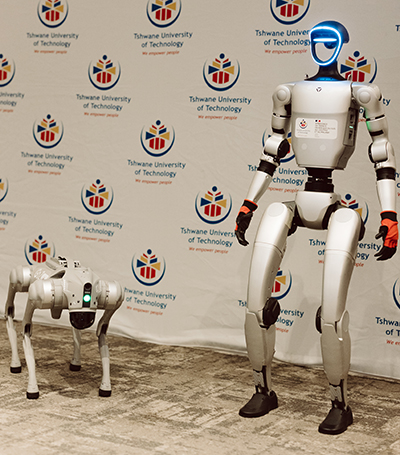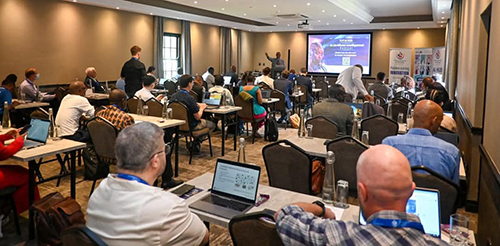by Phumla Mkize
Researchers and industry leaders in artificial intelligence (AI) are gathered in Pretoria, South Africa to showcase the opportunities that exist through technology to solve societal challenges.

TUT Vice-Chancellor and Principal, Prof Tinyiko Maluleke welcomes researchers gathered in the capital for the AI Seminar.
Brought together by the Tshwane University of Technology (TUT) Hub of the Artificial Intelligence Institute of South Africa (AI-ISA), experts from South Africa, France, Switzerland and Greece are spending two days in conversation about AI solutions in key industries.
The seminar – supported by the French Embassy in South Africa, Lesotho and Malawi and the TUT Hub of AI-ISA – started on 4 March and concludes on 5 March.
TUT Vice-Chancellor and Principal, Prof Tinyiko Maluleke, welcomed the researchers from various fields of AI, including robotics and machine learning.
Prof Maluleke noted that it was only two years ago that the TUT AI Hub was launched by the Department of Communications and Digital Technologies on 24 March 2023, commending the strides it has made in the higher education sector and the country.
“The TUT AI Hub has zoomed in on various societal challenges, such as mitigating the effect of climate change on food security, healthcare provision for, among others, people living with disabilities or severe injuries.”
Prof Maluleke emphasised the transformative power of AI and its potential for economic growth. He also highlighted the challenges brought about by AI, one of which he said is the growing digital divide within and between countries, and between geopolitical regions. He lamented the harmful relationship between the Fourth Industrial Revolution and environmental sustainability and noted gaps in AI regulation and governance, as well as concerns regarding ethics and transparency.
“Nor has the ownership and dispersal of most powerful AI tools and capabilities been democratic. Currently, the commanding heights of 4iR and AI industry are owned and monopolised by a handful of superrich individuals and oligarchs.
“Microsoft, Google, Apple and their equivalents in China have a predilection for locking their customers into their own suites of applications and products. Even the celebrated AI practitioner, Kai-Fu Lee is concerned about what he calls ‘the trend toward monopolisation in the online world’. He is even more worried about what he calls, ‘AI’s natural affinity for monopolies [which] will bring winner-take-all economics to dozens more industries’,” he said.
In his stirring welcome, Prof Maluleke set the stage for the first day of the seminar, which featured presentations and discussions on the AI ecosystems and collaborations, as well as AI in telecommunications and AI in farming.
TUT researchers showcased innovative projects that the University is spearheading for the farming and telecommunications sectors.
TUT AI Hub Acting Director, Prof Anish Kurien, said the seminar is a start of an on-going conversation. He said more still needs to be done to enhance awareness of AI programmes and educational content.
The second day on 5 March focuses on AI in healthcare, transport and education.

TUT robots.

International researchers and experts in AI are discussing innovations to deal with societal challenges.
For media enquiries and interviews contact the University spokesperson Phaphama Tshisikhawe,
